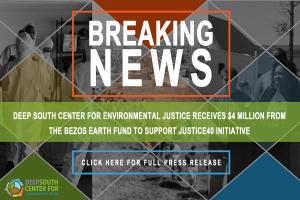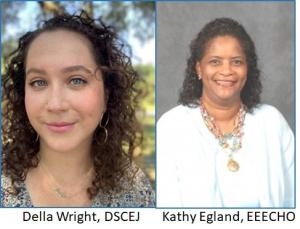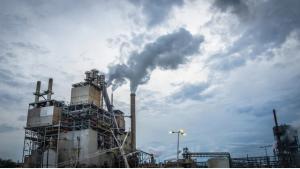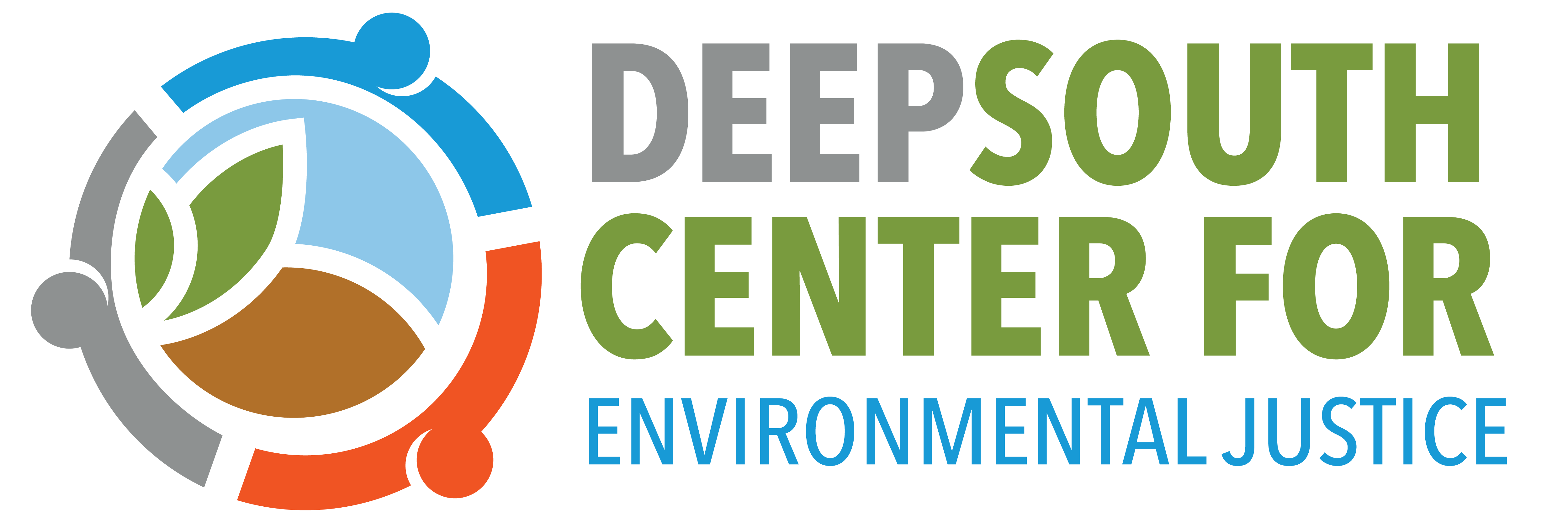
Sep 14, 2021 | The Latest News
Today, the Deep South Center for Environmental Justice (DSCEJ) and partner organizations in the Energy Future New Orleans coalition filed a motion for the City Council to hold Entergy accountable by ordering
1. a full investigation of Entergy’s massive power outage that contributed to the deaths of 12 New Orleans residents;
2. an independent management audit of Entergy companies;
3. a thorough examination of the costs Entergy bills New Orleans customers for the new gas plant sited near Black and Vietnamese American residents in New Orleans East that did not work on its own, as Entergy claimed to win Council approval for it.
DSCEJ’s commitment to environmental justice led us to oppose the gas plant based on our research and analysis of the data and facts showing Entergy did none of the following: implement best practices on site selection criteria to protect communities from the gas plant pollution, evaluate alternative energy options ordered by the City Council, and provide a credible reason for the gas plant. We have since worked on alternative energy options by supporting a local policy for community solar projects, coordinating the Climate Action Equity Project, and advocating for a renewable portfolio standard.
In the aftermath of Hurricane Ida, what worked was rooftop solar with battery storage. What did not work was dirty energy.
Join DSCEJ in calling on the City Council to hold Entergy accountable and build an energy system that works for everyone. Let’s expand solar energy with battery storage at places that serve the public and in neighborhoods that are most vulnerable to climate change, where Entergy bills hit residents the hardest with one of the highest energy cost burdens in the nation.
Power to the people without delay!
Download Motion for City Council to hold Entergy accountable

Sep 8, 2021 | The Latest News
The Bezos Earth Fund announced pledges of $203.7 million in grants providing critical support to nonprofits working to advance climate justice, advocate for climate-smart economic recovery, and spur innovation in decarbonization pathways. This includes $73.7 million in immediate donations across 12 organizations, as well as a pledge of an additional $130 million by the end of 2021 to organizations supporting the Justice40 Initiative.
“This funding is just the next step in the Bezos Earth Fund’s commitment to creating catalytic change during this decisive decade,” said Andrew Steer, president of the Bezos Earth Fund. “With each grant, we are helping organizations unblock progress and create pathways to a more sustainable future.”
Advancing Climate Justice
The Bezos Earth Fund disbursed $20 million of the new grants across four climate justice groups, alongside a pledge of an additional $130 million by the end of 2021. Recipient organizations are creating the building blocks for Justice40 — a whole-of-government effort in the U.S. to deliver at least 40% of the overall benefits from federal investments in climate and clean energy to disadvantaged communities.
Grantees include the Deep South Center for Environmental Justice ($4 million), the Partnership for Southern Equity ($6 million), the Robert D. Bullard Center for Environmental and Climate Justice at Texas Southern University ($4 million), and WE ACT for Environmental Justice ($6 million). These groups are increasing community access to the Justice40 decision-making process, encouraging front-line organizations to apply for Justice40 funding, assisting in the monitoring of the implementation of Justice40 to local levels, and expanding a partnership with historically Black colleges and universities (HBCUs) into 12 southern states. Read more

Sep 8, 2021 | The Latest News
CONTACT:
Dana Johnson, 1-773-495-1677, media@dscej.org
NEW ORLEANS, LA (September 8, 2021) – Today the Deep South Center for Environmental Justice (DSCEJ) announced it has received $4 million from the Bezos Earth Fund to support its Activating Justice40: The Justice40 Community Engagement Project. This project will leverage the Communiversity Model developed by DSCEJ Founder and Executive Director, Dr. Beverly Wright, to support community-based organizations (CBOs) and environmental justice (EJ) groups in the local implementation of Justice40.
The Justice40 Initiative was announced by President Joe Biden as part of his whole-of-government approach to embedding environmental justice in the operations of the federal government. It requires that historically disadvantaged communities receive 40 percent of the overall benefits of federal investments in the areas of clean energy and energy efficiency; clean transit; affordable and sustainable housing; training and workforce development; the remediation and reduction of legacy pollution; and the development of critical clean water infrastructure.
“We are excited to receive funding from the Bezos Earth Fund to support our Justice40 Community Engagement Project,” said Dr. Wright. “For more than 30 years, we have been dedicated to building the capacity of community-based environmental justice organizations to engage in the decision-making process on issues that directly affect their quality of life. This is the first time that our funding acknowledges systemic racism and sufficiently invests, with monetary resources, in a way that will break through barriers that have historically denied equal access and protections for African Americans and other People of Color. We are grateful for this support and look forward to an ongoing partnership.”
The Communiversity Model expands the knowledge and develops the capacities of CBOs and EJ-focused organizations to effectively engage in local decisions on the Justice40 Initiative. The Justice40 Engagement Project will support these groups in a way that elevates their voices in the development of state and local processes for directing the federal funding made available by the Justice40 Initiative, so that their communities are not overlooked or otherwise excluded from these benefits.
Launched in 2020, the Bezos Earth Fund is a $10 billion commitment to fund scientists, activists, NGOs, and private-sector entities that are taking critical action to combat the climate crisis, preserve and protect the natural world, and support climate justice.
The Deep South Center for Environmental Justice is dedicated to improving the lives of children and families harmed by pollution and vulnerable to climate change in the Gulf Coast Region through research, education, community, and student engagement for policy change, as well as health and safety training for environmental careers.

Aug 18, 2021 | The Latest News
Della Wright, Evaluator and Assistant Director of the Childhood Wellbeing Division at the Deep South Center for Environmental Justice are joined by Kathy Egland from EEECHO (Education, Economic, Environment, Climate, and Health Organization), a CBO in Gulfport, Mississippi.
In this episode, Della and Kathy discuss how their collaboration impacted the translation of COVID-19 data in Mississippi communities that have been historically impacted by air pollution and how they used that data to leverage resources for the community. (Click here to listen to the podcast)
To learn more about the Bloomberg American Health Initiative and the Bloomberg Fellows Program, visit https://americanhealth.jhu.edu/.

Aug 11, 2021 | The Latest News
Dr Elica A Moss, at Alabama A&M University, explains the ongoing issue of disproportionate air pollution exposure in African-American communities in the US. Working with the Deep South Center for Environmental Justice, Dr Moss highlights an issue that is deeply influential on the health outcomes of African-American communities.
When it comes to African-American communities, Governments have successively failed to tackle issues that cause ongoing, generational health issues. Now, with a global focus on air quality, climate change is at the forefront of discussions. Much like the Global South is taking the heaviest hit from air pollution, it appears that within the US, African-Americans are disproportionately suffering from air pollution exposure.
Dr Moss explains that: “African Americans, people of color and those from low-income communities face many environmental issues in addition to air pollution exposure.”
Read more

Jul 30, 2021 | The Latest News
I’ll never forget the words of Emelda West, a small but mighty grandmother and activist from St. James Parish, La. It was in the late 1990s, and we had just worked together to stop the construction of a plastics plant in her hometown. West put her hand on my arm and said, “Dr. Wright, I just love you. I appreciate the work you’ve done to keep the poisons out of our community. But what we really need now are jobs for our kids.”
In the last year, many Americans have awakened to the layered injustices faced by communities of color. There’s the routine harassment and violence at the hands of the police. The polluting facilities — from plastics factories to bus depots and coal-fired power plants — that always seem to land in our neighborhoods. The underfunded schools, inadequate health care, and, as West observed, the persistent and devastating lack of opportunity.
In St. James Parish and across the country, our communities are coping with deep-rooted, multifaceted harms. Yes, we need to stop those harms from happening — by stopping the construction of new poison-spewing facilities, for example. But we also need to repair and revitalize the places we call home. It’s a complex challenge that calls for a holistic response. It calls for environmental justice.
For years, the mainstream environmental movement focused on a series of separate issues — from saving the whales to reducing greenhouse gas emissions. The remedies were also narrowly targeted, through policy measures like cap-and-trade, for example, or techno-fixes like carbon capture and storage. Read more






